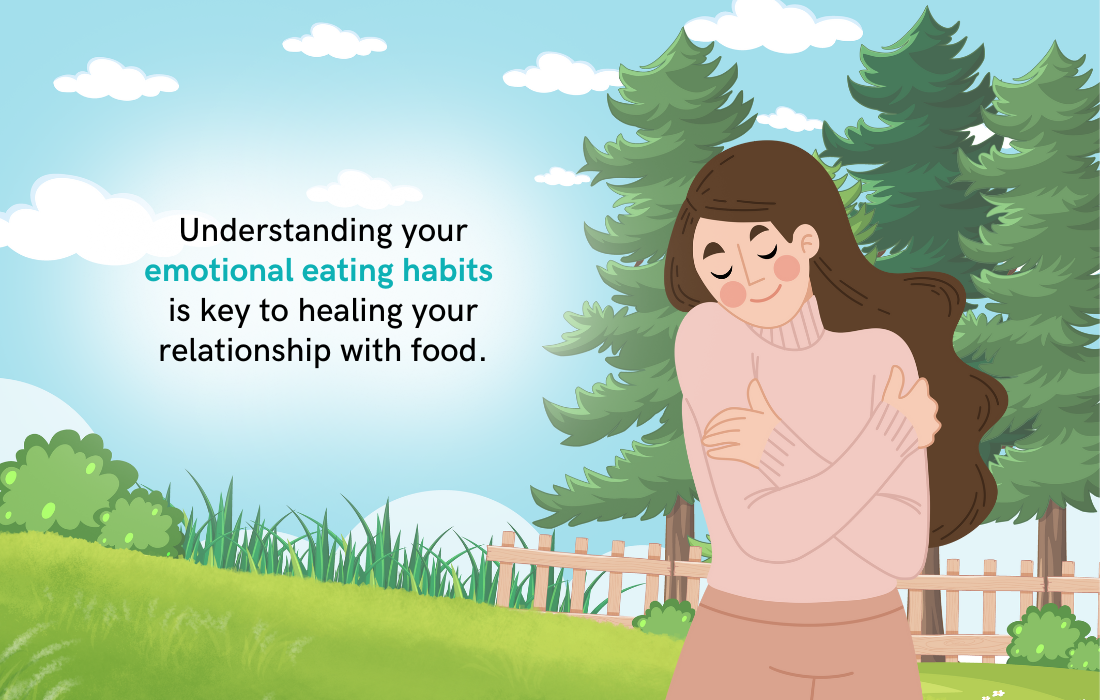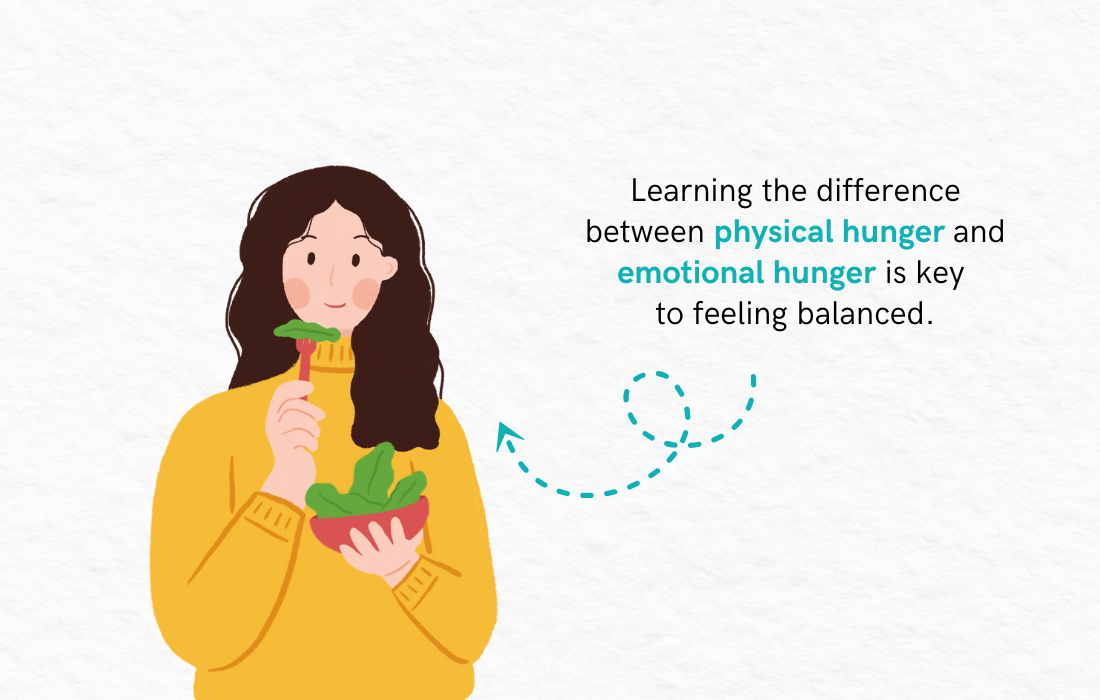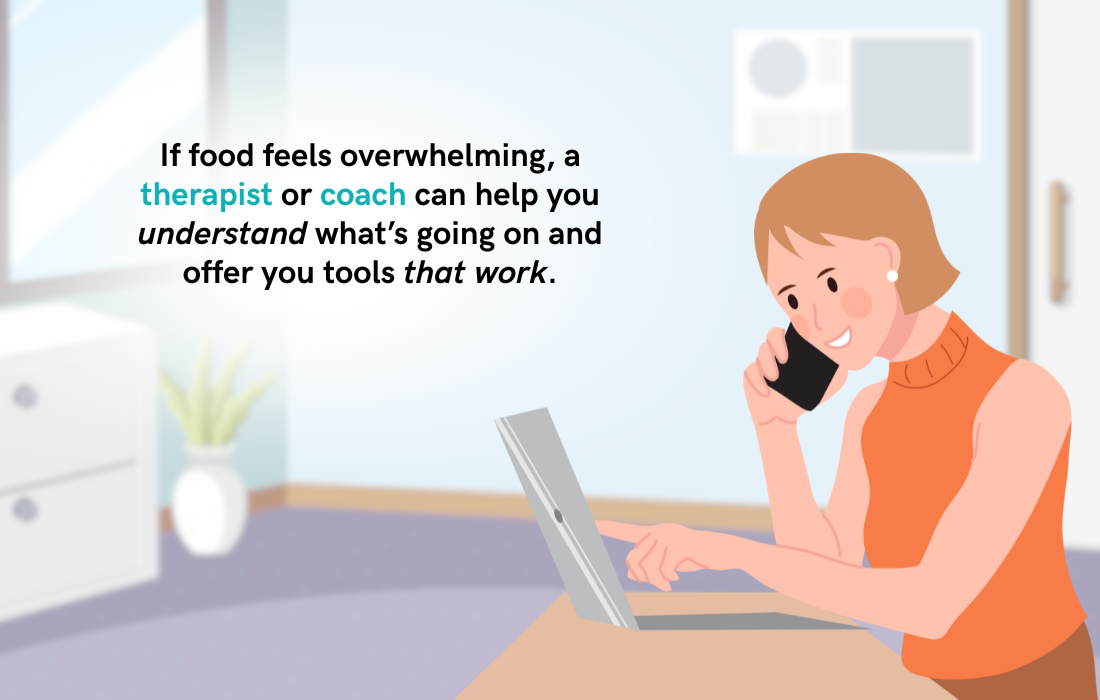What should I do if I’m feeling out of control with food?
Start by pausing. When we’re locked in the food battle, it’s hard to make any rational decision. Take a few deep breaths to interrupt the spiral and check in with how you’re feeling.
Ask yourself if you’re physically hungry or trying to soothe an emotion like stress, boredom, or loneliness. Remind yourself that it’s okay to eat, and you don’t have to be perfect with food.
Then choose one small, supportive action—like going outside, journaling, or eating something nourishing without guilt.
Feeling out of control doesn’t mean you’ve failed—it’s a signal to respond with curiosity and care, not judgment. You know you’re in the midst of a food battle when you’re thinking things like, “Don’t eat that!” No, I want to eat it!”
When this happens, just pause, breathe, and check-in with yourself.
Written by Jenn Hand, Holistic Nutritionist, Board Certified Health Coach, NBC-HWC
First, Let’s Figure Out Why You Feel Out of Control With Food
Feeling out of control with food often stems from deeper patterns/habits—not a lack of willpower.
Restrictions like dieting, skipping meals, or labeling certain foods as “bad” can lead to intense food cravings and eventual overeating. Emotional stress also plays a big role. When we don’t have other tools to cope with challenging feelings, food can become the fastest and most accessible way to find relief.
Many people simply haven’t learned how to respond to their needs without turning to food, especially if eating has always been their go-to comfort. Understanding these root causes helps you shift away from shame and toward lasting change.
14 Things You Can Do If You’re Feeling Out of Control with Food
When you’re in the thick of an urge to binge or emotionally eat, it’s easy to feel powerless and out of control.
While in-the-moment tools can help stop a binge before it starts, they work best when paired with long-term strategies that heal your relationship to food. Think of it like a two-part approach: calming the immediate storm while also working on the root causes.
Both are essential to help you feel more at peace and in control around food. You don’t have to do all 14—start with one or two that feel doable and go from there. Small shifts over time really add up!
| In the Moment (When You Want to Binge or Eat Emotionally) | Long-Term Solutions (To Feel in Control Around Food) |
|---|---|
| Pause and take 3 deep breaths before eating | Eat consistently throughout the day—don’t skip meals |
| Ask: What am I really needing right now? (comfort, rest, distraction?) | Build a regular eating pattern that includes satisfying meals |
| Give yourself permission to eat without guilt—then slow down | Practice intuitive eating and body trust daily |
| Choose a grounding activity first: short walk, journal, breathing exercise | Explore emotional needs with a therapist or coach |
| Eat what you want without multitasking—just be present | Let go of diet rules and restriction that trigger binges |
| Keep safe, calming snacks on hand (something you enjoy) | Learn the difference between physical hunger and emotional hunger |
| Don’t punish yourself afterward—respond with compassion and kindness | Create routines for stress relief, sleep, and movement |
Here’s How to Recognize Emotional Eating Triggers (And Why It Matters!)
Understanding your emotional eating patterns is one of the most powerful steps you can take in healing your relationship with food.
Ask yourself when you’re most likely to binge—is it after a long workday, when you’re lonely, anxious, or bored? These situations often mask deeper emotional needs that aren’t being met. When you can name the negative emotions that push you toward food, you’re more likely to respond in new and empowering ways.
Emotional eating isn’t about lack of willpower—it’s about trying to soothe discomfort. Once you see the pattern, you can begin to choose something different.

How to Identify Physical Hunger vs Emotional Hunger
Learning the difference between physical and emotional hunger is key to feeling balanced around food.
Physical hunger builds gradually, is felt in the stomach, and is satisfied by a variety of foods. Emotional hunger, on the other hand, often comes on suddenly and is linked to specific food cravings—usually favorite binge foods or sugary foods—and isn’t satisfied even after eating.
Emotional hunger also tends to bring guilt or shame after eating, while physical hunger doesn’t. Take a look at WHY you want certain things.
Can you pause and ask, “Is my body truly hungry, or am I feeling something I want to soothe?”
If we’re using food for something other than physical hunger, it’s worth looking at getting those needs met in other ways.
Let’s Reframe Negative Thoughts About Food
Many of us carry judgmental, black-and-white thoughts like “I was so bad for eating that” or “I ruined everything with that!”
These kinds of thoughts only fuel shame and keep us stuck in cycles of dieting/overeating. Start by noticing the voice in your head—then gently shift it to something more neutral or kind.
“I ate more than I needed, and I can still care for myself”
“Even if I ate more than I thought I should, I’m going to aim for self-care and balance the rest of the day.”
Reframing doesn’t mean pretending everything is perfect—it just helps you step out of the guilt spiral. Changing your thinking around food leads to less emotional reactivity, more self-trust, and more balance!

Give Yourself Permission to Enjoy All Foods
This was super challenging for me and usually happens for women in increments—not in one fell swoop!
When you work to give yourself unconditional permission to eat all types of food, you take away the charge of certain foods. power. What we restrict becomes more desirable and often turns into a binge.
But when our “forbidden foods” become neutral and normalized, they lose their emotional charge.
You might find that the foods you once obsessed over no longer hold the same grip. This permission is a key principle of intuitive eating, and it leads to more peace, enjoyment, and freedom in your relationship with food.
Why Restricting Can Just Make You Feel More Out of Control Later
It’s a paradox: the more you try to control what you eat through restriction, the more out of control you often feel.
I know because I lived this one for many many years! This is because your body and brain perceive restriction as deprivation, which can trigger strong food cravings and the urge to binge later.
This cycle of deprivation and rebellion fuels the diet/binge cycle that feels hard to break.
When you allow yourself to eat consistently and without harsh rules, the sense of calm and control returns. You can trust your body again—but it starts by releasing the grip of restriction.
How Eating Regularly May Be Your “Secret Weapon”
One of the simplest, most overlooked tools for feeling more in control is eating regularly.
I still conscious do this every day and work with every client to find their pattern of “regular.” Skipping meals or waiting too long to eat often leads to intense hunger, which makes it harder to make intentional choices.
When your body is nourished throughout the day, binges fall away.
Regular meals and snacks help stabilize your energy, reduce the urge to binge, and create a predictable rhythm your body can rely on. It might not sound glamorous, but consistent eating is often the foundation of long-term healing. I recommend adding protein every time you eat, eating every 3-4 hours to get a sense of a rhythm and routine for your body.

Focus Your Attention on Enjoyable Activities Beyond Eating
When food becomes our only joy and excitement, it’s even more challenging to “stop” eating.
Food can become the main source of comfort, entertainment, or stress relief if nothing else fills those roles. Begin exploring activities that offer similar emotional benefits—like taking a walk, listening to music, journaling, calling a friend, or something creative that uses your hands.
Shifting your focus doesn’t mean ignoring your emotions—it means expanding your toolkit beyond food. These activities can give you a break from thinking about food all the time. The more joy you add to your life, the less likely food becomes your only source of it.
Get Professional Support When You Need It
If your relationship with food feels overwhelming, you don’t have to go through it alone.
A therapist, emotional eating coach, nutritionist, or registered dietitian can help you untangle what’s going on and offer tools that truly work. It’s especially helpful to work with someone who specializes in binge eating or emotional eating, as they understand the unique nuances of these struggles.
Professional support can bring clarity, relief, and a sense of momentum when you’re feeling stuck. You deserve that kind of help—no matter how long you’ve been struggling.
Be Patient With the Healing Process
As I tell all my clients, this can be a very windy journey.
Healing your relationship with food is not a straight line—it’s a winding path with progress, pauses, and learning along the way. There’s no such thing as doing it perfectly, and you don’t need to fix everything overnight.
Every small shift in awareness, every binge you interrupt, and every compassionate choice you make adds up. Celebrate your growth, even if it feels slow.
The more patient and kind you are with yourself, the more powerful and lasting your transformation will be.

Common Questions
Why do I feel so out of control with my eating?
Feeling out of control often stems from patterns of disordered eating, where restriction leads to intense food cravings and often bingeing.
It can also be triggered by negative emotions that we try to soothe through food instead of addressing what’s really going on.
How do you treat compulsive overeating?
Healing involves looking at your eating behavior with curiosity (and compassion!) and learning how to better respond to triggers and emotions without using food as the only coping tool.
It also includes building a foundation of healthy eating without restriction so that you don’t feel deprived around your favorite binge foods.
What are the signs of overeating?
Signs may include feeling physically uncomfortable after meals, regularly eating past fullness, or struggling to control eating, especially around sugary foods or junk food.
Overeating can sometimes mask deeper issues related to stress, emotional needs, or underlying mental health conditions.
How can I tell if I have a “binge eating disorder?”
While it’s important not to self-diagnose, a common eating disorder like binge eating may involve eating large amounts of food in a short time, feeling shame, and a lack of being able to control your food.
If your eating behavior feels distressing or unmanageable, seeking support can help clarify what’s going on and offer real healing.
Related Articles
- Coping with Food Cravings the Balanced Way – Tips from a Nutritionist
- Why Am I Obsessed with Food? My Answer + 10 Potential Reasons
- How to Have Self Control with Food
- Why Do I Think about Food All the Time? Here’s Exactly Why
Get the Normal Eater’s Newsletter
Join 8000+ women who are overcoming overeating, binge eating, and breaking up with dieting forever. Get Jenn’s inspiring and actionable weekly newsletter with the latest posts, podcasts, and tips on how to love your body, find food freedom, and lose weight holistically.
Get the Normal Eater’s NewsletterWork with an Emotional Eating & Holistic Nutrition Coach
Overcome Bingeing and Emotional Eating and Break Up with Yo-yo Dieting
Working with an emotional eating coach and holistic nutritionist can help you get free from the frustrating binge and restrict cycle and stop yo-yo dieting.
You don’t have to be obsessed with food or have a million rules around eating to find your natural weight and learn to love your body. Ready to actually see a lasting change and experience true freedom?
Schedule a 20-min CallAbout the Author:

Jenn Hand has been helping women like you become normal eaters since 2015.
She’s worked with thousands of women, helping them to balance their bodies, end bingeing, stop obsessing over food, and start feeling amazing again. As a board-certified health coach and holistic nutritionist, Jenn knows how to support you in making real positive changes that last.
Her articles have been published on Mind Body Green, Tiny Buddha, Thrive Global and other local and global media platforms. She’s the author of How to Be a Normal Eater and the creator of The Normal Eater’s Club program. Listen to Jenn’s advice and tips on the Cake Doesn’t Count Podcast, or read more of her articles for free on the Food Freedom Blog.
Learn About Coaching!




